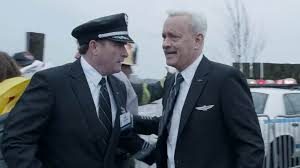No one dies today is a theme of director Clint Eastwood’s latest film Sully (2016). There are other ideas competing.
Sully is typically Eastwood on the issues, but in a far more subtle way than his Million Dollar Baby.
The idea remains the same. Logistics, technicalities and rules and regulations get in the way of the core issue: humanity.
Million Dollar Baby, where a promising boxer’s career comes to an untimely end, appeared to say that the rules against euthanizing her were ludicrous. This is in light of a young woman’s demise where her young life had more than stalled. Her life on earth appeared to have halted in its tracks.
Some disagreed with the view that her life could be humanely ended, but Sully takes a similar route with a palatable story to present the same sort of ideas that were in Million Dollar Baby.
Chesley ‘Sully’ Sullenberger is an experienced pilot who saves 155 passengers on a flight in 2009. He crash lands the plane on the Hudson River in New York and evacuates the passengers in the dead of winter.

Sullenberger’s an all American hero, but the National Transportation Safety Board (NTSB) make an investigation into Sullenberger’s piloting technique. Did he make the right choice when their computer simulation shows that the plane could have been landed in another direction safely?
The portrayal is controversial. The NTSB are portrayed as the one dimensional rule makers. And, the movie says, in such a regulated environment, they lose sight of the humanity. Sullenberger saved lives. Why doesn’t the NTSB see it?
Law and grace
Sullenberger’s choice in the end turned a potential tragedy into a victory, but the NTSB scream over the logistics of such an undertaking.
Sully shows that there is law and there is grace. It’s saying that grace should be showered on humanity—in a rather libertarian fashion—rather than let laws stifle the most humane grace that can be given by another human being.
This is theme that is asking why didn’t we see the humanity in Million Dollar Baby?
The kind of grace in Sully is not specifically religious or Christian grace. Humanity is at the center, but I have a hunch that director Clint may be thinking, God guided Sullenberger to the best end. Perhaps, but I don’t know.
I think God’s grace per-se has never been obvious in an Eastwood film. Sullenberger is referred to in one scene by a reporter as “a man for all time”. Humanity is central. God is up there perhaps, but God’s not obvious as the guiding life of Sullenberger’s rescue.
For all these reservations, Sully affirms life in a purely platonic way. No one dies today. The fact that all the people were saved on the flight is two thumbs up.
The rescue made every New Yorker’s day. New Yorkers were in need of something uplifting says the film. Instead of a tragedy, a victory is made out of a potential tragedy instead.
Out on DVD December 20, USA
